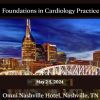People who binge drink usually experience an irregular heartbeat or a heart "flutter". However, new findings suggest that drinking even smaller amounts of alcohol on a regular basis can increase a person's risk of irregular heartbeat. The study is published in the Journal of the American College of Cardiology.
"There has been a lot of attention in recent years about the benefits of drinking small amounts of alcohol for the heart," says lead author, Professor Peter Kistler, MBBS, PhD, of Baker IDI Heart and Diabetes Institute and the Alfred Hospital in Melbourne, Australia. "The results are significant, since chances are, there are people who are consuming one to two glasses of alcohol per day that may not realise they are putting themselves at risk for irregular heartbeat."
See Also: Current Models Do Not Predict Atrial Fibrillation Risk Accurately
Irregular heartbeat, also known as atrial fibrillation, not only directly affects the heart itself, but is a leading cause of stroke, heart failure and other heart-related complications.
More than 100 previous studies have shown that a light to moderate intake of alcohol — up to seven standard drinks per week for women and 14 standard drinks per week for men — can actually be good for some people, and reduce the risk of heart disease. However, this review shows this is not the case when it comes to irregular heartbeat.
For this study, Dr. Kistler and colleagues followed nearly 900,000 people for 12 years. Based on the results, every alcoholic drink per day translated into an eight percent increase in the risk of irregular heartbeat, both in men and women.
"While moderate amounts of alcohol appear protective for the 'plumbing' or blood supply to the heart muscle, the benefits of alcohol do not extend to the electrical parts of the heart or heartbeat," Dr. Kistler explains. Heart cells contract in a coordinated way by movement of electrical signals between cells. Over time, drinking may actually change these electrical signals, triggering irregular heartbeat.
In addition, drinking can damage the cells and lead to small amounts of fibrous tissue within the heart causing an irregular heartbeat. Dr. Kistler's study found that people who continue to drink are more likely to have ongoing irregular heartbeats even after catheter ablation, an important treatment for irregular heartbeat where parts of the heart are cauterised.
"People who continue to consume alcohol at moderate rates may also notice their irregular heartbeats become more frequent. This is concerning, because it can lead to serious issues, such as heart failure and stroke," Dr. Kistler says. "So, even though we do not have randomised data that tells us what a 'safe' amount is to consume, people with an irregular heartbeat should probably drink no more than one alcoholic drink per day with two alcohol free days a week."
According to the review team, more research is needed to determine the specific causes responsible for the relationship between alcohol and irregular heartbeat. It’s also important to determine whether avoiding alcohol completely is required for patients who have irregular heartbeats.
Source: American College of Cardiology
Image Credit: Pixabay
References:
Voskoboinik A. et al. (2016) Alcohol and atrial Fibrillation: a sobering review. Journal of the American College of Cardiology, 68(23): 2567-76.
Latest Articles
Alcohol Intakem Irregular Heartbeat
New findings suggest that drinking even smaller amounts of alcohol on a regular basis can increase a person's risk of irregular heartbeat. The study is published in the Journal of the American College of Cardiology.























